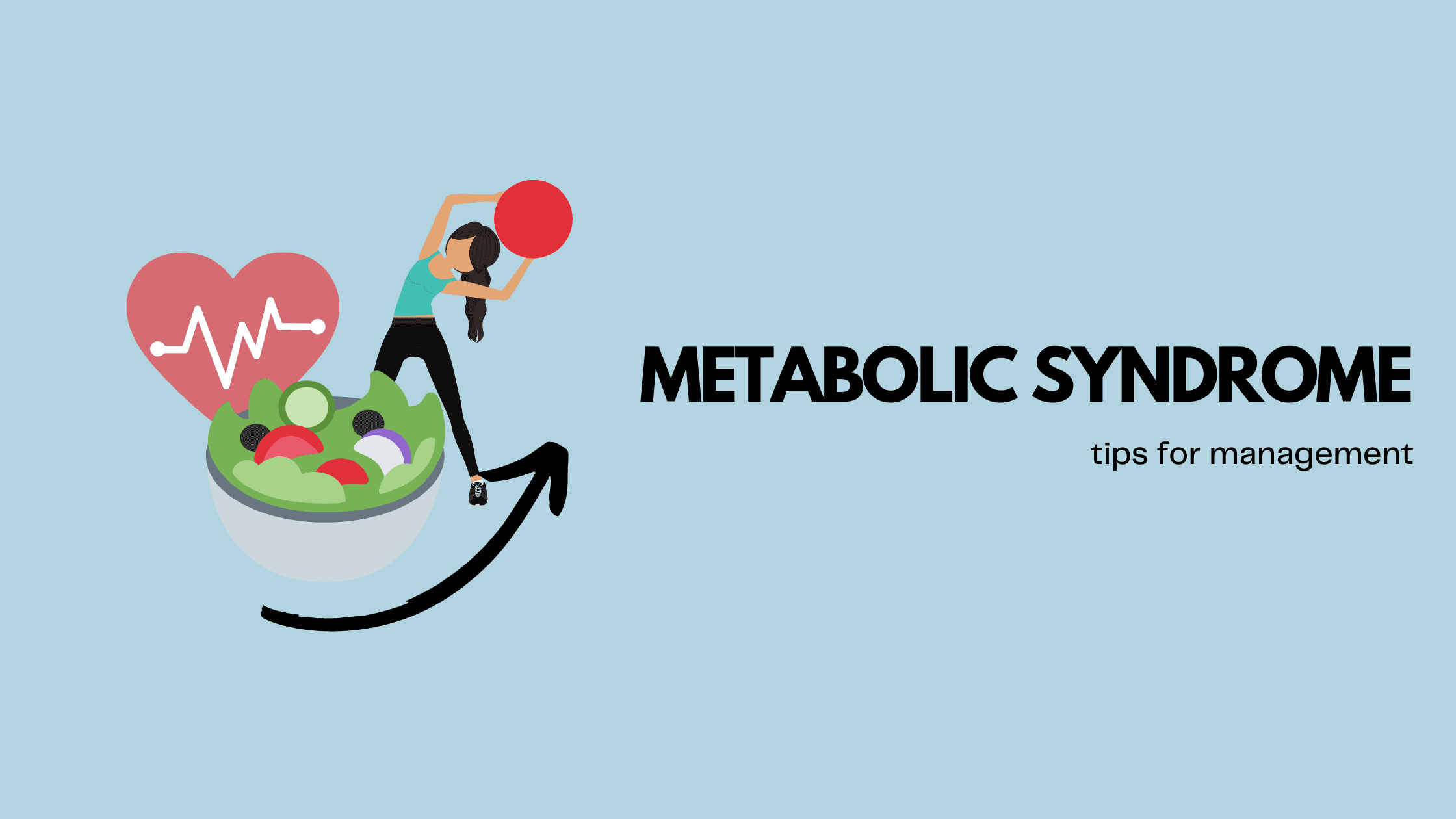
Metabolic syndrome is defined as the coexistence of multiple risk factors posing a threat to the cardiovascular system. This syndrome includes insulin resistance, dyslipidemia (abnormal lipid levels), obesity and high blood pressure (hypertension). These conditions are interconnected, and they share common mechanisms to occur. More than 30% of the adult population in the US suffers from metabolic syndrome according to one criterion. (R).[1]
Causes
The causes of metabolic syndrome are linked with obesity and a sedentary lifestyle. These causes act together to cause the syndrome.
Overweight and obesity
Bone, muscle, fat and body water contribute to your body weight. The terms overweight and obesity are often used interchangeably to indicate that your weight is greater than that of a healthy individual of your age and height. However, they are to define two different conditions. Obesity means an excessive amount of fat in the body; meanwhile, overweight means weighing too much. Abdominal obesity or generally known as ‘large waistline,’ is an indicator of metabolic syndrome.
Calories
Before reading further, let’s have a brief look at calories. Calories are the measurement of energy and are the fuel for cellular functions. Food is your source of energy. Your calory requirement is unique and is different for every individual. Daily intake of calories requirement also depends on the calories burnt out as a result of your physical activity. Obesity is a negative outcome of mismatch between the calories – when you consume more and burn less. Your body built and weight depends on various factors, including your genetic makeup, diet habits, consumption of food with high fat and a sedentary lifestyle. Obesity is related to other diseases like diabetes, heart disease, stroke and arthritis. Reducing weight could significantly affect your body positively.
Insulin resistance
Your digestive system converts the foods you eat into sugar. Insulin is a hormone secreted by your pancreas that helps sugar enter your cells to be used as fuel. When you have insulin resistance, your body fails to use insulin properly. Insulin is a hormone that helps cells to let blood sugar enter your cells to generate energy. Insulin resistance would not let this happen, so cells would not take up glucose without the facilitation. Subsequently, it will elevate sugar levels in the blood. You are at more risk of having metabolic syndrome if you got diabetes during pregnancy (i.e. gestational diabetes) or a family history of type 2 diabetes.
Inactive Lifestyle
An inactive lifestyle is another condition that contributes to overweight or obesity and consequently causes metabolic syndrome. An inactive lifestyle is simply explained as being a couch potato or no exercise at all. Using computers, laptops for work, mobile phones, watching television, playing video games are the activities you engage in while sitting. Your commutes are about just sitting in a seat. COVID era made everyone spend more time sitting in one place since many are working from home. Also, the pandemic locked down people inside homes and forced them to have a sedentary lifestyle.
Age
Another risk factor for metabolic syndrome is age. The risk goes high as you get older and older. The rationale behind this is
Genetics
The most essential and unavoidable risk factor is genetics. When genetics is considered, you must note that either ethnicity or family history plays a role. Some studies conducted in the United States claim that risk is high in non-Hispanic Whites compared to Black populations (R), while some other findings suggest that Hispanics have increased risk than non-Hispanic Whites (R).
If you have metabolic syndrome, you might have a tendency to develop abnormal blood clotting too. This condition itself poses a threat to the heart and brain.
Other causes
Some other disease increases your risk of metabolic syndrome. They can non-alcoholic fatty liver disease (NASH), polycystic ovary syndrome (PCOS). Some medications which make you gain weight or alter your blood pressure, sugar and cholesterol levels also would contribute to metabolic syndrome.[2][3]
Signs
Disorders linked with metabolic syndrome do not show signs and symptoms. As mentioned above, the. The most visible sign is the large waistline. Elevated blood sugar might show signs and symptoms related to diabetes such as excessive thirst and urination, fatigue etc.[4][5]
Diagnosis
The only person who can diagnose metabolic syndrome is your healthcare provider. The diagnosis depends on the excellent history, including detailed family history, physical examination and blood work. Diagnosis with metabolic syndrome is following the existence of at least three of the risk factors listed below. (R)
- Large waistline – differs between men and women. A waist measurement of 35 inches or more for women and 40 inches or more for men is considered a large waistline.
- High triglyceride level – any values above 150 mg/dL are considered high.
- Low HDL cholesterol level – differs between men and women. LDL values less than 50 mg/dL for women and less than 40 mg/dL for men are considered low HDL levels.
- Elevated blood pressure – reading of 130/85 mmHg or above. A single reading of such increase does not count.
- High fasting blood sugar, any consecutive readings which are 100 mg/dL or higher. However, a single reading of such increase does not count.
Treatment
As you read at the beginning of this article, metabolic syndrome poses a risk to the cardiovascular system predominantly. Therefore, the treatment for metabolic syndrome pays attention to a heart-healthy lifestyle. A lifelong commitment to a healthy lifestyle may prevent the conditions that cause metabolic syndrome. Prevention and treatment strategies are almost similar. Following are the factors to consider for a healthy lifestyle.
Maintaining a healthy weight
Using your body mass index, aka BMI, you should be aware of your desired weight. Weight management plays a crucial role in keeping metabolic syndrome away. To maintain weight, you should take extra care of your meals and physical activity.
Choosing appropriate meals
Your focus should be on reducing the amount of saturated and trans fats you eat. Instead, pick whole grains, fruits, vegetables and lean meat. Choose low-fat and low-calorie food. Break your meal into smaller portions. Despite disease status, it is always advisable to drink plenty of water instead of sugary drinks to stay adequately hydrated and maintain a healthier lifestyle in the long term.
Engaging in physical activity
Exercising regularly is an essential requirement to keep yourself healthy—the benefits of regular physical exertion range from increasing your self-esteem to reduce your risks of contracting chronic diseases.
Depending on age group, requirements and possibilities vary. Younger adults can engage in moderate or vigorously intense physical activity. Adopting exercise as a routine daily activity from childhood, your children lead a healthy lifestyle without much of a hassle. Older adults and pregnant women, and people with special needs should discuss their physical activity with their health care provider. They should be aware of the amount and types of physical activity they should do.
Tips for exercise
- As a baseline, adults should target 150 minutes of moderately intense physical activity per week. If it’s vigorous intensity, a minimum of 75 minutes is preferred per week.
- Try aerobics like walking, swimming and biking are simple and can be performed without any special equipment.
- Workout in segments if you cannot allocate a long time to complete your activity.
- Keep your schedule spread over the week instead of trying to complete it all in one day.
- At least twice a week, do strengthening exercises. Strengthening exercises may be a physical exertion without equipment like sit-ups and push-ups or using some exercise equipment like lifting weights.
- Do exercises in sets of 8-12 repetitions focusing on each of your muscle groups.
Relieve from stress
Stress can affect anyone at any time. It does not necessarily be bad, because sometimes stress would help us perform well or even save our life. However, prolonged stress could affect you mentally and physically, leading to various destructive outcomes.
You may experience stress routinely when it is related to regular activities like work, family commitments and responsibilities. Stress can affect you following an unexpected life event, like the demise of a partner, divorce or losing your job. Finally, traumatic stress is another type that results from the danger of getting hurt or killed. Events like war, natural disasters, accidents etc., can cause this type of stress. It is also known to cause post-traumatic stress disorder (PTSD).
Coping up with stress also differs between individuals. Prevention of stress depends solely on your hand on how you proactively make decisions on stress. Planning, prioritizing and organizing would help you to avoid stress. You can read more about tracking stress in our blog article.
Quit smoking
If you are a smoker, now it is time to think about quit smoking. Smoking of any type is harmful to your health. Especially smoking is proven to cause blockage in your blood vessels and eventually cause cardiovascular disease (e.g. heart attack/myocardial infarction) and cerebrovascular disease (e.g. stroke).
Getting a drug therapy
In case if you don’t have significant improvement following lifestyle changes, you might need medications. Your healthcare provider would follow up and discuss therapies that are appropriate for you. Medications include drugs to bring down levels of cholesterol, blood sugar and blood pressure.
For example, by bringing your blood cholesterol level down, you can have fewer chances of having a heart attack or stroke. If you have already developed diabetes, heart disease or had a prior stroke the physician would consider starting drug therapy to prevent your blood cholesterol. Similarly, other drugs target to lower your blood pressure, decrease your chance of having a heart attack, prevent blood clots, thereby preventing a heart attack or stroke. Furthermore, these medications would reduce the workload of your heart.
An important factor in medications is compliance. Never change or skip your medications unless instructed by your physician. Following a drug regimen does not mean that you can ignore a heart-healthy lifestyle. But no, you should follow both of them.[7]
Complications
It may be confusing when you see the causes and complications are the same for metabolic syndrome. Metabolic syndrome can put you at more risk of developing the following diseases.
- Type 2 diabetes. Uncontrolled weight gain or failure to make lifestyle changes to bring down your weight, insulin resistance might occur. It can make your blood sugar levels rise and eventually lead to type 2 diabetes.
- Heart and blood vessel disease. The coexistence of high cholesterol and elevated blood pressure can cause the formation of atherosclerotic plaques in your blood vessels, especially Smoking will aggravate this plaque formation. These plaques are the reason behind narrowed and hardened arteries. They will eventually result in a heart attack or stroke.
Follow up
Following up metabolic syndrome is about following up your weight gain/loss, blood glucose level, cholesterol and blood pressure. Regular measurements and keeping track of them is essential and helpful for you and your healthcare provider to plan or modify your therapy. CareClinic is a one-stop health care app that can be your handy tool in following up metabolic syndrome.
Careclinic App
The CareClinic app offers numerous helpful features to help you maintain a personal health record. You can create a self-care plan, add your medications and supplements, track your diet and physical activities, and any therapies you receive. You can even set your healthcare team that manages your health. Add your physician, RN and family members to keep them in the loop of healthcare. Hence, the CareClinic app serves as an effective and easy tool to monitor your health.
Diary Entry
The diary entry feature lets you make entries about your daily life. Use the app’s diary entry feature to track day-to-day activities or events you encounter. You can also add measurements related to your health, such as blood pressure, blood glucose, weight, height, thyroid hormone values, etc.
Symptom Tracker
The symptom tracker lets you add symptoms you are experiencing. For instance, you can track symptoms associated with your medical conditions. You can start tracking your symptoms before seeking medical attention and compare how well the therapy relieves you from symptoms after visiting the doctor’s office. This helps seek medical attention during the disease-related symptoms, which might lead to complications. If you suffer from a medical condition or several, you can add these into the application and connect them to your care plan.
Pill Tracker & Reminder
Medications are important. Never forget your pills – let it be your multi-vitamins or any prescription medication. Leave it to the CareClinic app. Get reminders before you run out of your medicine. Have a look at our blog article on pill tracking. Keep in mind that this application can also generate reminders for doctor appointments and organize an entire care team to help you with your medical needs.
Reports
Reports are another great feature in the CareClinic app. They can provide a lot of perception into your lifestyle. CareClinic’s reports consider your logs in diary, nutrition, activities, symptoms etc., and subsequently generate reports to show the associations between those entries. This connection would be helpful to learn more about yourself and your disease-related changes.
You can use the CareClinic app to store health information regularly, and the app will use them to generate monthly reports. Since these reports will provide a clearer picture of your health status and treatment, they will help you and your physician explore appropriate treatment solutions for metabolic syndrome.
Nutrition
CareClinic offers a nutrition tracker, which helps you maintain your diet log. Whether you are well or not, you should keep track of your food to ensure adequate intake of nutrition for your wellbeing. Meanwhile, this nutrition tracker will also help identify your cravings and help you manage them. If you have a specific diet to change your food habit, you can follow your diet and reflect on how you can live a healthy life.
Activity

Therapy
It is difficult to remember and recall all of the details related to procedures and treatments you have pursued. You can use the CareClinic app to record and retrieve all therapies, procedures, treatments and medications recommended to you. Maybe you are seeing a family physician or undergoing surgery – you can record all of your appointments and therapies so that you never forget something.
Sharing my health record from the CareClinic app
Using the CareClinic app, you will be able to export your health-related data and share it with your family, caregivers and physicians. You can either export a CareClinic generated report as a PDF file or print and share it with your health care provider. Also, you can show your concerns from your CareClinic app itself. These reports will contain essential health information, allowing the physician to review your health history and work on your treatment plan.
Are you diagnosed with diabetes or high blood pressure or having someone in your family who had metabolic syndrome? Do you have serious concerns over your health or want to be cautious about metabolic syndrome or diabetes mellitus or general health? Go ahead and download the CareClinic app today from the Google Play Store or Apple App Store and be in control of your health.
References
- “Prevalence of metabolic syndrome in the United States National Health and Nutrition Examination Survey 2011-18 – PubMed”. https://pubmed.ncbi.nlm.nih.gov/36906842/
- “Metabolic Syndrome – Causes and Risk Factors | NHLBI, NIH”. https://www.nhlbi.nih.gov/health/metabolic-syndrome/causes
- “Association of sedentary behaviour with metabolic syndrome: a meta-analysis – PubMed”. https://pubmed.ncbi.nlm.nih.gov/22514690/
- “Metabolic Syndrome – Symptoms | NHLBI, NIH”. https://internet-prod.nhlbi.nih.gov/health/metabolic-syndrome/symptoms
- “Symptoms and Diagnosis of Metabolic Syndrome | American Heart Association”. https://www.heart.org/en/health-topics/metabolic-syndrome/symptoms-and-diagnosis-of-metabolic-syndrome/
- “Metabolic Syndrome – Diagnosis | NHLBI, NIH”. https://www.nhlbi.nih.gov/health/metabolic-syndrome/diagnosis
- “American Heart Association Recommendations for Physical Activity in Adults and Kids | American Heart Association”. https://www.heart.org/en/healthy-living/fitness/fitness-basics/aha-recs-for-physical-activity-in-adults/
- “Smoking and Cardiovascular Disease | Arteriosclerosis, Thrombosis, and Vascular Biology”. https://www.ahajournals.org/doi/10.1161/ATVBAHA.113.300156


